|
|
|
Sort Order |
|
|
|
Items / Page
|
|
|
|
|
|
|
| Srl | Item |
| 1 |
ID:
178062
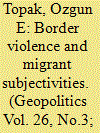

|
|
|
|
|
| Summary/Abstract |
This article draws on ethnographic fieldwork material from Greece to investigate the types of subjectivities migrants develop when they are confronted by the material border violence. It utilizes an aleatory materialist theory of subjectivity and mobilizes four analytical categories to illustrate the diversity of migrant subjectivities: abject, religious, nomadic, and dissident. The article further demonstrates that migrants might move from one category to another or belong to multiple categories at the same time. This article contributes to the critical literature that challenges the mainstream reductive representation of migrant subjectivity (either as victims or criminals) by developing an aleatory materialist framework and emphasizing the intersections and shifts among migrant subjectivity categories.
|
|
|
|
|
|
|
|
|
|
|
|
|
|
|
|
| 2 |
ID:
085261
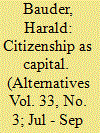

|
|
|
|
|
| Publication |
2008.
|
| Summary/Abstract |
As subordinate workers, migrants and foreigners are an essential labor force for industrialized economics.
|
|
|
|
|
|
|
|
|
|
|
|
|
|
|
|
| 3 |
ID:
103142
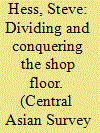

|
|
|
|
|
| Publication |
2009.
|
| Summary/Abstract |
This work examines the labour export programme of south-west Xinjiang that brought Uyghur migrant workers to the Early Light Toy Factory in Shaoguan, Guangdong and places it in the context of capitalist-working class divisions emerging in contemporary China, where clashes between managers and workers have become frequent occurrences, and increasing worker solidarity and growing labour activism have become a leading concern of the Communist Party of China and an increasingly influential business class. The author suggests that labour export is primarily utilized not as a means to alleviate poverty and reduce minority-Han income gaps, as claimed by official sources, but as an instrument of business-class interests for dividing and conquering the shop floor through the ethnic diversification of the workforce, an age-old tactic of factory bosses harkening back to the manipulation of foreign-born workers in late-nineteenth-century industrial America.
|
|
|
|
|
|
|
|
|
|
|
|
|
|
|
|
| 4 |
ID:
117480
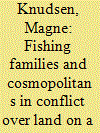

|
|
|
|
|
| Publication |
2012.
|
| Summary/Abstract |
Research on the social effects of tourism and beachfront property development in Southeast Asia finds that foreigners and local elites reap the main benefits, rather than fishing families and coastal communities, who also become vulnerable to displacement. This article, discussing cleavages and co-operation among parties brought together in court cases over land on a Philippine island, demonstrates that poor coastal dwellers just north of Dumaguete City on Negros Island differ in their ability to use social relations within and beyond kin groups to resist development-induced displacement from the increasingly lucrative foreshore. Members of families who are considered to be descendants of the 'original people of the place' have been far less vulnerable to displacement pressure than settlers with more of a 'migrant' status.
|
|
|
|
|
|
|
|
|
|
|
|
|
|
|
|
| 5 |
ID:
159844
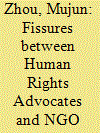

|
|
|
|
|
| Summary/Abstract |
This article uses a case study to analyse the fissures between human rights advocates and NGO practitioners. Since 2009, the Open Constitution Initiative, an organization run by human rights advocates, has been campaigning for migrant children's right to attend local schools. While fragmented resistance on the same issue has long existed in activities organized by migrant community NGOs, there has been almost no cooperation between the two parties during the campaign. Based on ethnographic research, I elaborate on how these two groups of activists differ in their strategies and goals, and how their choices are related to their understanding of political struggle and political transformation. I contend that this case provides a new lens through which to view the recent decline in some human rights activism in China, and illustrates the importance of investigating the internal structure of civil society.
|
|
|
|
|
|
|
|
|
|
|
|
|
|
|
|
| 6 |
ID:
160444
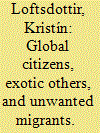

|
|
|
|
|
| Summary/Abstract |
This article reflects on Europe’s problematic relationship with its ‘others’, asking in particular how the idea of the ‘exotic’ – constituting one of Europe’s ‘imperial ruins’ – intersects with the figure of the Muslim migrant. The Muslim migrant has in the present become in Europe a potent marker of otherness, which reflects how some cosmopolitan aspirations are perceived negatively in European discourses, revealing how mobility itself is racilized and gendered. WoDaaBe Fulani migrants from Niger have historically occupied a subject position in Europe as identified with ‘the exotic’. The article discusses WoDaaBe temporary migration to Europe to supplement their income back home, and their intersecting positions as ‘exotic’, as Muslims and black Africans. While contemporary discourses tend to highlight Europe’s status as a site of equality, human rights, and cradle of civilization, some bodies are welcome within the space of Europe while others are not.
|
|
|
|
|
|
|
|
|
|
|
|
|
|
|
|
| 7 |
ID:
064863
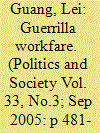

|
|
|
| 8 |
ID:
093842
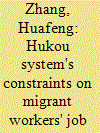

|
|
|
|
|
| Publication |
2010.
|
| Summary/Abstract |
Most studies on discrimination against migrants in Chinese cities focus on wage differentials. This paper endeavours to develop an alternative way of explaining the institutional discrimination against migrants by studying workers' job mobility rates in three cities: Beijing, WuXi and Zhuhai. Migrants are commonly perceived to have high occupational mobility; however, Cox proportional hazards regressions in this paper show a different picture. Institutional discrimination reduces the number of jobs available to the migrants, increases their job search costs and the cost of losing jobs. Even though migrants take jobs unacceptable to local residents, the effects of this institutional discrimination still constrain migrants in changing jobs. The regressions show that temporary migrants have longer job durations and shorter unemployment durations than local people or permanent migrants. Moreover, migrants start to change jobs more often only after they have stayed in the city for some time and have accumulated enough assets to be able to survive when unemployed.
|
|
|
|
|
|
|
|
|
|
|
|
|
|
|
|
| 9 |
ID:
161770
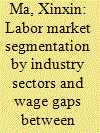

|
|
|
|
|
| Summary/Abstract |
This paper explores the influence of labor market segmentation by industry sectors on the wage gap between rural-to-urban migrants and local urban residents in China in the 2000s. Using Chinese Household Income Project (CHIP) survey data and the results based on the Brown decomposition method, the results indicate that the influence of intra-industrial differentials is greater than the influence of inter-industry differentials in both 2002 and 2013. The influence of the explained component of the intra-industry differentials is larger in both 2002 and 2013, and the influence of the unexplained component of the intra-industrial differentials rises steeply from 2002 to 2013. These results show that the individual characteristic differentials (e.g. human capital) in the same industry sector is the main factor causing the wage gap in both 2002 and 2013, and the problem of discrimination against migrants in the same industry sector became more serious from 2002 to 2013.
|
|
|
|
|
|
|
|
|
|
|
|
|
|
|
|
| 10 |
ID:
097379
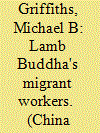

|
|
|
| 11 |
ID:
151624
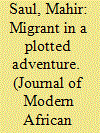

|
|
|
|
|
| Summary/Abstract |
This article presents the cases of two migrant men, a Senegalese and a Nigerian, who spent many years in Istanbul. Although their backgrounds, personalities and circumstances were different, they both did export-related commercial work in the city. After describing sub-Saharan migration to Turkey and the literature concerning it, the text focuses on the stories these migrants spontaneously presented as they explained why they had become migrants. It was striking that with very different personal details, events and coincidences, both stories attribute the decision to migrate to Istanbul to a traumatic accident that forced the protagonists to change a life that until that point did not involve transnational migration. In the stories the protagonist's ambition, determination and will are rendered invisible and he is presented as a victim. I call this rhetorical topos ‘great mishap’. It resonates with stories I have heard from other migrants. I interpret it as an expression of compunction, of social responsibility weighing on the actor for abandoning close others in favour of an individual quest for self-realisation.
|
|
|
|
|
|
|
|
|
|
|
|
|
|
|
|
| 12 |
ID:
097020
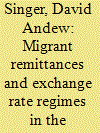

|
|
|
|
|
| Publication |
2010.
|
| Summary/Abstract |
This article argues that the international financial consequences of immigration exert a substantial influence on the choice of exchange rate regimes in the developing world. Over the past two decades, migrant remittances have emerged as a significant source of external finance for developing countries, often exceeding conventional sources of capital such as foreign direct investment and bank lending. Remittances are unlike nearly all other capital flows in that they are stable and move countercyclically relative to the recipient country's economy. As a result, they mitigate the costs of forgone domestic monetary policy autonomy and also serve as an international risk-sharing mechanism for developing countries. The observable implication of these arguments is that remittances increase the likelihood that policy makers adopt fixed exchange rates. An analysis of data on de facto exchange rate regimes and a newly available data set on remittances for up to 74 developing countries from 1982 to 2006 provides strong support for these arguments. The results are robust to instrumental variable analysis and the inclusion of multiple economic and political variables.
|
|
|
|
|
|
|
|
|
|
|
|
|
|
|
|
| 13 |
ID:
154549
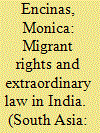

|
|
|
|
|
| Summary/Abstract |
This paper provides a new and original perspective on the plight of migrants in India. It incorporates an in-depth and practical analysis of Indian legal policies through the lens of migrant and refugee rights. In examining the extra-legal provisions operating in two of India's borderland states—Assam and Jammu & Kashmir—I show how special legal exemptions in Indian law inherently undermine efforts to protect migrant rights. I argue that these extraordinary laws hinder pathways to justice in three distinct ways: by circumventing international principles of non-refoulement; challenging the jurisdiction of India's Supreme Court; and delegitimising migrant-friendly laws. In highlighting an often overlooked aspect of migrants’ rights issues, this paper brings the human element of India's regional border disputes and related legal mechanisms to the fore.
|
|
|
|
|
|
|
|
|
|
|
|
|
|
|
|
| 14 |
ID:
119903
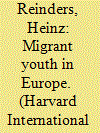

|
|
|
|
|
| Publication |
2012.
|
| Summary/Abstract |
Cars were burning from rioting on the streets. Moroccan and Algerian youth were running amok in the suburbs of Paris and Lyon. Helpless police forces were unable to control the escalating violence. Then-Minister of Internal Affairs Nicolas Sarkozy threatened the mob with announcements of tighter law enforcement and stricter legal penalties. Eventually, the situation was brought under control, but those events left a lasting impression. In 2005, Europeans realized they were confronted with a young migrant generation that was at-risk and in need of serious attention.
|
|
|
|
|
|
|
|
|
|
|
|
|
|
|
|
| 15 |
ID:
152446
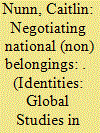

|
|
|
|
|
| Summary/Abstract |
Many immigrant-receiving countries are characterised by increasing multigenerational ethnocultural diversity, with associated policies and discourses of inclusion. Yet they often simultaneously resist relinquishing narratives and practices grounded in idealised notions of ethnocultural homogeneity. This results in the circulation of multiple, often competing, ideas of the nation, with significant implications for national (non)belonging among migrants and their descendants. Based on interviews with members of seven Vietnamese Australian families, this article explores their discursive navigation of two competing ideas of Australia: as ethnocultural and multicultural. Applying a conceptual framework of belonging that attends to the relation between the personal and the political, this article demonstrates that, for migrants and their descendants, national (non)belonging is a dynamic and dialogic process of negotiating multiple national spheres, each governed by different politics and offering different possibilities for belonging. The multigenerational interview cohort additionally provides insights into the role of migration generation in mediating this process.
|
|
|
|
|
|
|
|
|
|
|
|
|
|
|
|
| 16 |
ID:
173170
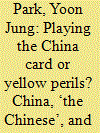

|
|
|
|
|
| Summary/Abstract |
Over the past several years there have been a number of racially-tinged incidents in South Africa involving ‘the Chinese.’ Simultaneously, the love affair between Chinese and South African government leaders has expanded to include local Chinese community leaders and local ANC officials. Based on ongoing research on Chinese communities in South Africa I examine these conflicting phenomena and explore the various ways in which the three main ethnic Chinese communities – Chinese South African, Taiwanese South African, and mainland Chinese migrant – and other South Africans respond to these often conflicting social and political messages. I argue that China’s global ascendance and South Africa’s increasing national-level dependence on China encourages some actors (both Chinese and non-Chinese) to opportunistically wield the China card while other non-Chinese South Africans respond with fear and racism, invoking Yellow Peril narratives.
|
|
|
|
|
|
|
|
|
|
|
|
|
|
|
|
| 17 |
ID:
095610
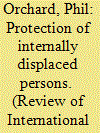

|
|
|
|
|
| Publication |
2010.
|
| Summary/Abstract |
Internal displacement is increasingly perceived as an international problem. This has led to suggestions that international norms have begun to govern state behaviour towards their own displaced populations. I argue that this change occurred through the innovative use of soft law, in particular the guiding principles on internal displacement, by a consortia of norm entrepreneurs including NGOs and a UN Office, that of the Representative of the Secretary-General for Internally Displaced Persons. As soft law, these principles lack the usual markers which suggest an emerging norm. Instead, the article argues that alternative methods - including the international recognition of the principles and their adoption in domestic legislation - has triggered a change in state behaviour. This is demonstrated by examining two cases of forcible return of IDPs - the closure of the Kibeho Camp in Rwanda in 1995, before the principles were created, and the closure of the Znamenskoye camp in Ingushetia, Russia in 2002, after their creation. Both situations are similar in that the norm appears to have been rejected - forced repatriation did occur. In the Russian case, however, government statements, along with widespread international condemnation of the closures, suggest rhetorical instantiation of a norm of non forcible return for IDPs.
|
|
|
|
|
|
|
|
|
|
|
|
|
|
|
|
| 18 |
ID:
097221
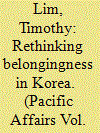

|
|
|
| 19 |
ID:
175167
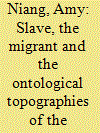

|
|
|
|
|
| Summary/Abstract |
An examination of the figure of the slave and the figure of migrant make visible important historical interconnections that sustain past and present elaborations of the human and ‘the international’. These interconnections have always been racialised and they have structurally constituted the making of an interdependent world community. A series of instrumentalised discourses, at times turned into rationalities that govern policies towards migrants, particularly in a post 9/11 context, increasingly normalises the idea that there are people that can be justifiably expelled from the civic/civil, and increasingly human sphere. The slave was forcefully removed, both physically from attachment to kin and land, and morally from the history of humankind. The migrant is pushed out of the bounds of the livable as well as the moral category of rights-bearer. The commonalities that configure both phenomena are rooted in an extractive supply economy and a hierarchised ordering of humans. The article uses the history of Frederick Douglas to show that the absence of ‘care’ as methodology of relationality limits the valence of interdependence as a marker of a globalised world. In doing so, it challenges the unexamined assumptions of new/posthumanism that advocates radical interdependence without interrogating the modalities of ‘humanity’ among different categories of humans.
|
|
|
|
|
|
|
|
|
|
|
|
|
|
|
|
| 20 |
ID:
164711
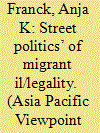

|
|
|
|
|
| Summary/Abstract |
Immigration control constitutes a particular technique for regulating urban space and for controlling and disciplining migrant subjects within it. Unlike other manifestations of state power in exemplary urban settings, the architecture of urban immigration control is not recognisable through grand buildings or walls, but rather through its momentary presence and continuously shifting location: ad hoc identity controls in public spaces, roadblocks in neighbourhood streets or raids against workplaces. Building on fieldwork conducted in the Malaysian city of George Town, this article takes an interest in how migrants navigate this urban borderscape in order to avoid exploitation and encounters with the police. Read through Asef Bayat's notion of ‘street politics’, the article shows how migrants use the means (made) available to them in order to extend their room to manoeuvre. While such tactics are often driven by the force of necessity, they do nonetheless cumulatively encroach on the state's ability to produce migrants as (un)wanted or even (il)legal subjects in the city. Through this, migrants also challenge the very notion of what an exemplary urban space is as well as who is considered a legitimate part of it.
|
|
|
|
|
|
|
|
|
|
|
|
|
|
|
|
|
|
|
|
|